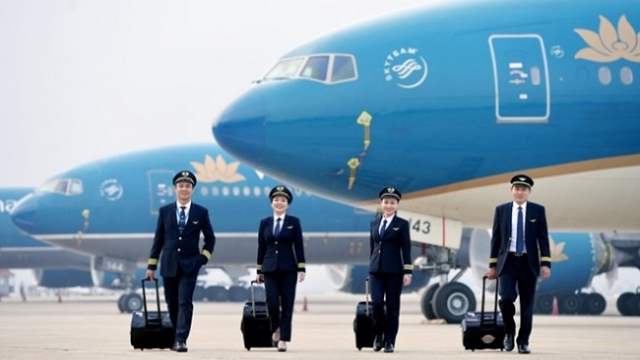Business
Vietnam Airlines seeks to prevent pilots from job-hopping
Vietnam Airlines is struggling to retain its pool of qualified pilots amid the so-called excessive competition in the aviation industry, despite a heavy upfront cost poured into recruiting and training these pilots.

Vietnam Airlines is seeking government's permission allowing it to set wages for pilots by its own in order to prevent further job-hopping.
Duong Tri Thanh, CEO of the national flag carrier told a meeting of Prime Minister Nguyen Xuan Phuc with high-skilled workers last week that the airline was coping with a brand drain on the back of a rising number of airlines joining the local aviation market.
To attract qualified and experienced pilots from well-established airlines like Vietnam Airlines, newcomers have been keen on offering more attractive salary package to these talents.
Data provided by Vietnam Airlines showed that it currently has a pool of up to 1,200 pilots available, out of the total 20,000 employees.
Some 25 years ago, pilots and engineers were mainly trained overseas, at a cost of about $200,000 per person. The cost was chiefly funded by official development assistance, the airline’s capital and some other sources.
Since 2000, Vietnam Airlines has taken the initiative to self-finance its pilot training and recruitment expenses. With the development of its domestic training institution, Vietnam Airlines has been able to train and employ nearly 800 local pilots and 2,500 engineers.
The airline is recruiting 400 foreign pilots.
According to Thanh, it takes up to three to four years to train an Airbus A320 or A321 captain and even as twice as much of the time for an Airbus A350 or Boeing 787 captain to be qualified.
“In the early stages of development, Vietnam Airlines considered that it was our responsibility to train a general pool of pilots. Yet losing almost 30 per cent of our pilots in a fleet to competitors is not reasonable. It costs us a lot of time and financial resources to train pilots and engineers. We thus cannot rest assured in our long-term investment into this given such instable and unsecured market,” Thanh said.
In order to retain high-skilled employees in the context of the fiercer competition, Thanh acknowledged the importance of upsizing the paycheck and ensuring the best working conditions for them.
In addition to an insurance package worth up to $17,300, Vietnamese pilots’ remuneration package has grown to reach some 75 per cent of their foreign counterparts over the years. On average, each Vietnamese pilot earns $6,500 on a monthly basis – an ideal income level in the local market, according to Thanh.
While recognising the current competition in the field, it is unfortunately not in Vietnam Airlines’ power to raise the pilot pay up high on its own as the airline is still a state-controlled enterprise.
Thanh therefore suggested the government to come up with a new decree to allow companies like themselves to take control of their policies, to help them retain skilled employees, and in this case to resolve the pilot shortage for airline.
Vietnam Airlines is operating more than 100 aircraft while its competitor Vietjet boasts a fleet of 70 and Bamboo Airways 10 planes.
Vietnam Airlines contests claims against pilot matters
Maersk rolls out electric trucks for inland transport in Vietnam
A.P. Moller–Maersk will deploy a fleet of heavy-duty electric trucks for inland container transport in Vietnam starting in the first quarter of 2026.
Grab and Charge+ partner to develop electric vehicle charging network in Vietnam
The partnership aims to expand the system of charging and battery swapping stations, providing Grab driver-partners and other EV users with easy access to flexible and reliable charging solutions.
Samsung Vietnam appoints its first Vietnamese senior executive
Samsung Vietnam appoints Nguyen Hoang Giang to SEVT senior leadership, the first Vietnamese executive in the company’s local manufacturing units.
Michelin leads the smart mobility revolution with data and AI
Michelin is undergoing a strong transformation by applying AI and smart analytic, helping lead the smart, safe, and sustainable mobility revolution in the Industry 4.0 era.
LG Innotek secures $200 million IFC loan following revenue drop
LG Innotek Vietnam Hai Phong secured a $200 million IFC loan as revenue slows, aiming to expand camera module production while meeting sustainability targets.
Leading with empathy in Vietnam’s billion-dollar investment flows
For Koen Soenens, Sales and Marketing Director at DEEP C, empathy is a compass that guides major deals, the way a leader builds a team, and the ambition to create a sustainable industrial zone that carries a Vietnamese identity.











































